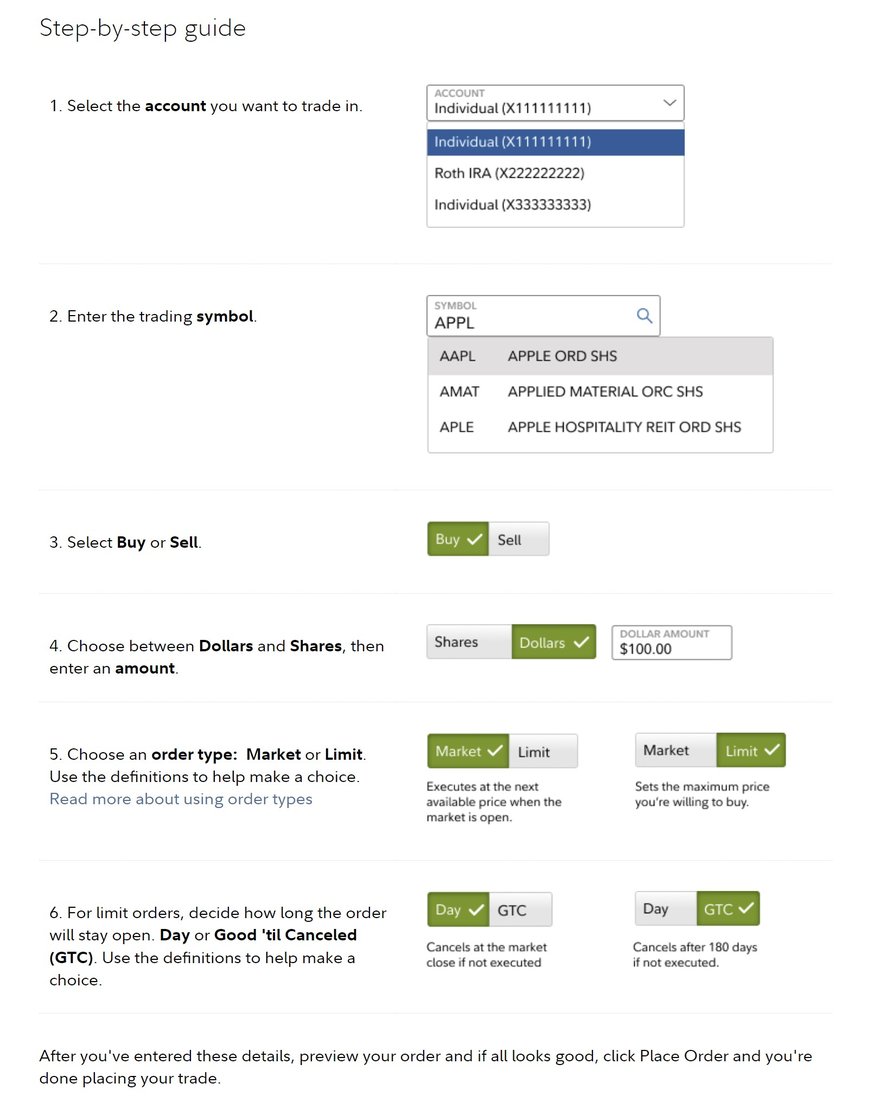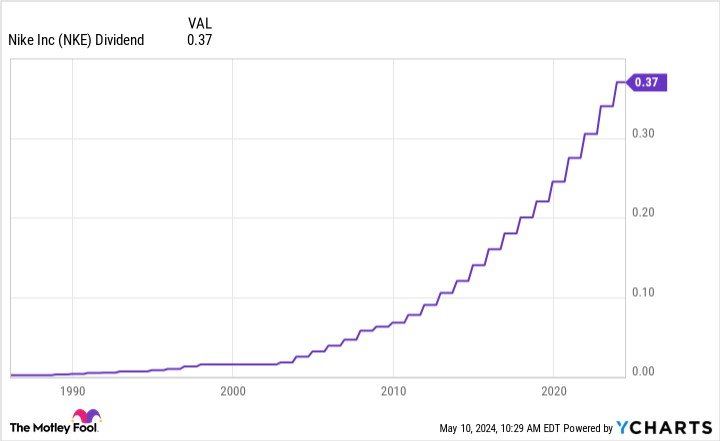Nike (NKE 0.27%) likely doesn't need much introduction. It's a leader in the sporting goods industry. The company designs and sells footwear, apparel, equipment, and accessories for a variety of athletic activities. It owns its namesake iconic Nike brand and Converse.
Many people wear Nike-branded shoes and apparel when they engage in physical activity. (You might have some on right now, which could have sparked your interest in learning how to invest in the iconic sporting goods company.)
This in-depth guide will teach you everything you need to know about Nike and how to add the shoe stock to your portfolio.
How to invest
How to buy Nike stock
Anyone interested in buying Nike stock can purchase shares. The athletics company trades publicly on the New York Stock Exchange. That allows anyone to buy the sporting goods stock through a brokerage account or online trading platform.
This four-step guide will show you how to invest in stocks and add Nike to your portfolio.
Stock
Step 1: Open a brokerage account
You'll want to open and fund a brokerage account before buying shares of any company. If you need to open one, here are some of the best-rated brokers and trading platforms. Take your time to research the brokers to find the best one for you.
Step 2: Figure out your budget
Before making your first trade, you'll need to determine a budget for how much money you want to invest. You'll then want to figure out how to allocate that money. The Motley Fool's investing philosophy recommends building a diversified portfolio of 25 or more stocks you plan to hold for at least five years.
You don't have to get there on the first day, though. For example, if you have $1,000 available to start investing, you might want to begin by allocating that money equally across at least 10 stocks and then grow from there.
Step 3: Do your research
It's essential to thoroughly research a company before buying its shares. You should learn about its competitors, its balance sheet, how it makes money, and other factors to make sure you have a solid grasp on whether the company can grow value for its shareholders over the long term. Continue reading to learn more about some crucial factors to consider before investing in Nike stock.
Step 4: Place an order
Once you've opened and funded a brokerage account, set your investing budget, and researched the stock, it's time to buy shares. The process is relatively straightforward. Go to your brokerage account's order page and fill out all the relevant information, including:
- The number of shares you want to buy or the amount you want to invest to purchase fractional shares.
- The stock ticker (NKE for Nike).
- Whether you want to place a limit order or a market order. (The Motley Fool recommends using a market order since it guarantees you buy shares immediately at market price.)
Here's a screenshot of how to buy a stock with the five-star-rated platform Fidelity (which offers a video tutorial and a step-by-step guide):

Once you complete the order page, click to submit your trade and become a Nike shareholder.
Should I invest?
Should I invest in Nike?
Investing is a personal endeavor. Your stock portfolio should reflect your values, risk tolerance, and return objectives. Not every stock will be a good fit for your portfolio. With that in mind, here are some reasons why you might want to invest in Nike:
- You are a fan of Nike's products.
- You want to invest in mature companies with strong cash flow and balance sheets.
- You're seeking companies that pay a solid and growing dividend.
- You think Nike stock trades at a good value relative to the broader market.
- Adding Nike would help diversify your portfolio.
- You think Nike can continue to grow its earnings per share at a solid rate in the coming years.
- You believe the company will continue delivering market-beating total returns over the long term.
On the other hand, here are some reasons why you might decide not to add shares of Nike to your portfolio:
- You don't like Nike's products.
- You already own shares of several sporting goods, footwear, and apparel stocks.
- You're seeking more dividend income than Nike currently provides.
- You want companies delivering faster growth than Nike.
- You're not convinced Nike will outperform the market in the coming years.
Profitability
Is Nike profitable?
Profitability is crucial to a company's success. Earnings tend to be the biggest factor driving a stock's long-term performance. Investors should take the time to research a company's profitability to ensure it's heading in the right direction.
Nike is a very profitable company. It reported $12.4 billion of revenue in its fiscal 2024 third quarter, up slightly from the previous year. Meanwhile, revenue over the first nine months of its fiscal year was $38.4 billion, a 1% increase from the previous year. The company's net income was almost $1.2 billion in its fiscal third quarter and $4.2 billion over the nine-month period. While its net income declined 5% year over year in the third quarter, it increased by 4% over the nine-month period compared to the previous year. Nike's earnings per share have grown even faster over the nine-month period (7%) due to a steady decline in its outstanding shares as it repurchases stock.
The company also produces a lot of cash, allowing it to return money to shareholders via dividends and share repurchases. Nike paid $562 million of dividends in its fiscal third quarter (up 6% year over year) and repurchased $866 million in shares. The repurchases were part of the company's four-year, $18 billion program, which its board of directors approved in June 2022. Nike had repurchased $8 billion of its stock under the program through early 2024.
Nike's solid and growing profitability has enabled it to maintain a strong balance sheet. It had $10.6 billion of cash, equivalents, and short-term investments at the end of its fiscal third quarter, exceeding its long-term debt ($8.9 billion).
Dividends
Does Nike pay a dividend?
Nike pays a dividend to its investors each quarter. In mid-2024, its quarterly dividend rate was $0.37 per share ($1.48 annually). With its share price in the low $90s at the time, Nike had a 1.6% dividend yield, slightly higher than the S&P 500's 1.4% dividend yield.
The athletics company has a long history of growing its dividend. It has increased the payment rate every year since 2004:

Nike's above-average yield and long history of dividend growth make it an ideal stock for investors seeking a steadily rising income stream.
ETFs
ETFs with exposure to Nike
Not everyone wants to be an active investor picking a portfolio of stocks they need to manage. The good news is that you don't have to be a stock picker, thanks to the ease of investing in exchange-traded funds (ETFs). These investments allow you to gain passive exposure to companies through a thematic approach or broad market index.
Exchange-Traded Fund (ETF)
As of mid-2024, 286 ETFs held 171.5 million shares of Nike, according to ETF.com. The Vanguard Total Stock Market ETF (VTI 0.0%) was the largest holder at 38.4 million shares. However, it had a relatively small allocation to the sporting goods stock, at 0.3% of its holdings.
Investors seeking an ETF with a higher allocation to Nike could consider one of the following alternatives:
- The Consumer Discretionary Select Sector SPDR Fund (XLY -0.24%): This sector ETF focuses on consumer discretionary stocks. It had 52 holdings in mid-2024. Nike was the seventh-largest holding at 3.2% of its net assets. The fund had a very low ETF expense ratio of 0.09%.
- First Trust Dow 30 Equal Weight ETF (NYSEMKT:EDOW): The fund holds a relatively equal weighting to all 30 members of the Dow Jones Industrial Average (Nike is a member of this venerable stock market index). The ETF focused on blue chip stocks had a 0.5% expense ratio.
Related investing topics
Stock splits
Will Nike stock split?
Nike didn't have an upcoming stock split as of mid-2024. The company's stock price traded in the low $90 range, a reasonably attainable level for most investors, so the company likely won't complete another stock price anytime soon.
Nike has split its stock several times throughout its history:
| Date | Stock Split Type |
|---|---|
| December 2015 | 2-for-1 |
| December 2012 | 2-for-1 |
| April 2007 | 2-for-1 |
| October 1996 | 2-for-1 |
| October 1995 | 2-for-1 |
| October 1990 | 2-for-1 |
| January 1983 | 2-for-1 |
If Nike continues to grow its earnings per share, its stock price should keep rising, eventually leading the company to announce another stock split.
The bottom line on Nike
Nike is an iconic sports brand. The company has created tremendous value for its shareholders over the years. It could continue doing so in the future as its earnings keep rising and it returns cash to shareholders through dividends and share repurchases. Those features make Nike look like a solid long-term investment.
FAQ
Investing in Nike FAQ
How do you become a shareholder of Nike?
You can become a Nike shareholder by purchasing its stock in a brokerage account. Nike is a publicly traded company listed on the New York Stock Exchange, so anyone can become a shareholder in the athletic apparel giant.
To become a Nike shareholder, you'd need to open and fund a brokerage account if you don't already have one. Next, you'd open up the order page with your broker and fill out all the fields, including:
- The number of shares you want to buy or the amount you want to invest in fractional shares (if your broker allows).
- Nike's stock ticker symbol (NKE).
- Order type (market or limit).
Once you've finished, double-check the order page to ensure everything is correct. Then, submit your order to become a Nike shareholder.
Who is Nike's biggest investor?
As of mid-2024, Nike's biggest investor was The Vanguard Group. The large asset management company owned 109 million shares (about 9% of Nike's outstanding shares) worth almost $12 billion, with 38.4 million shares held just by the Vanguard Total Stock Market ETF. The company owns those shares in its mutual funds and ETFs it manages on behalf of clients.
What is the stock symbol for Nike?
Nike trades on the New York Stock Exchange under the stock symbol NKE.
Where can I buy Nike stock?
You can buy shares of Nike through any online broker or trading platform. If you don't already have an account, here's a list of some of the top brokers.



















































































































































































































































